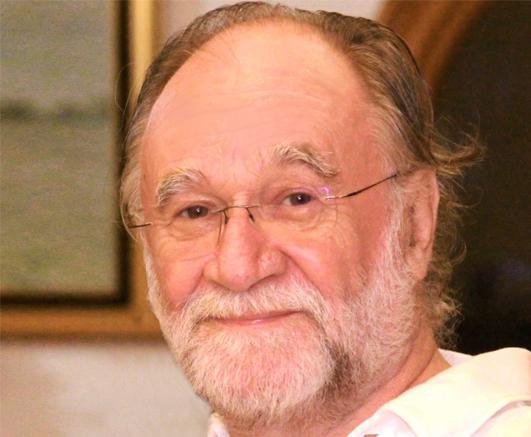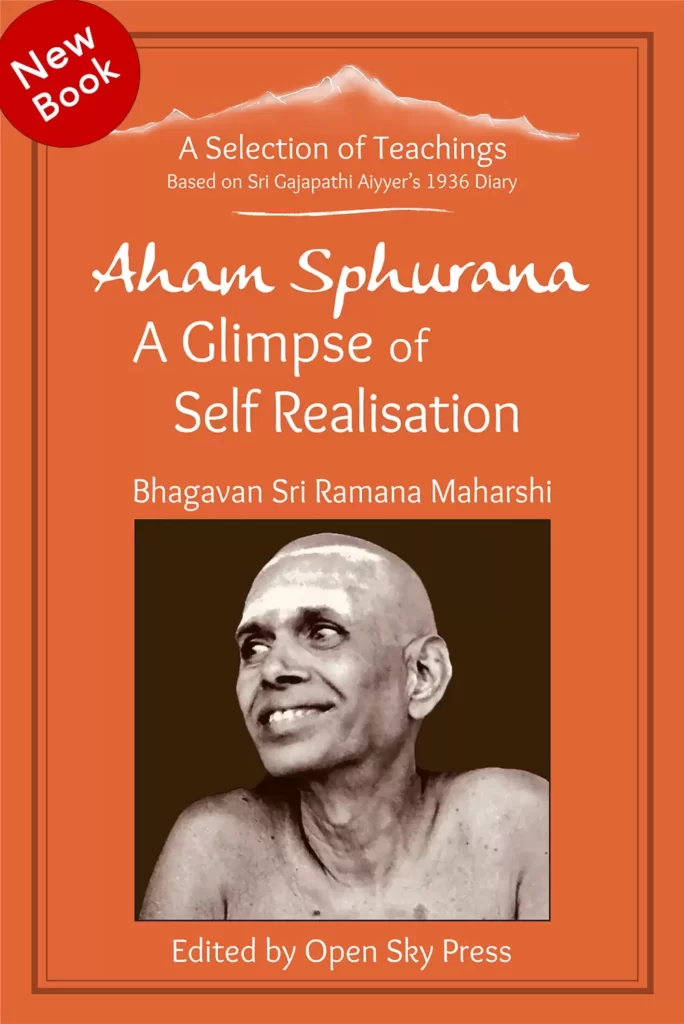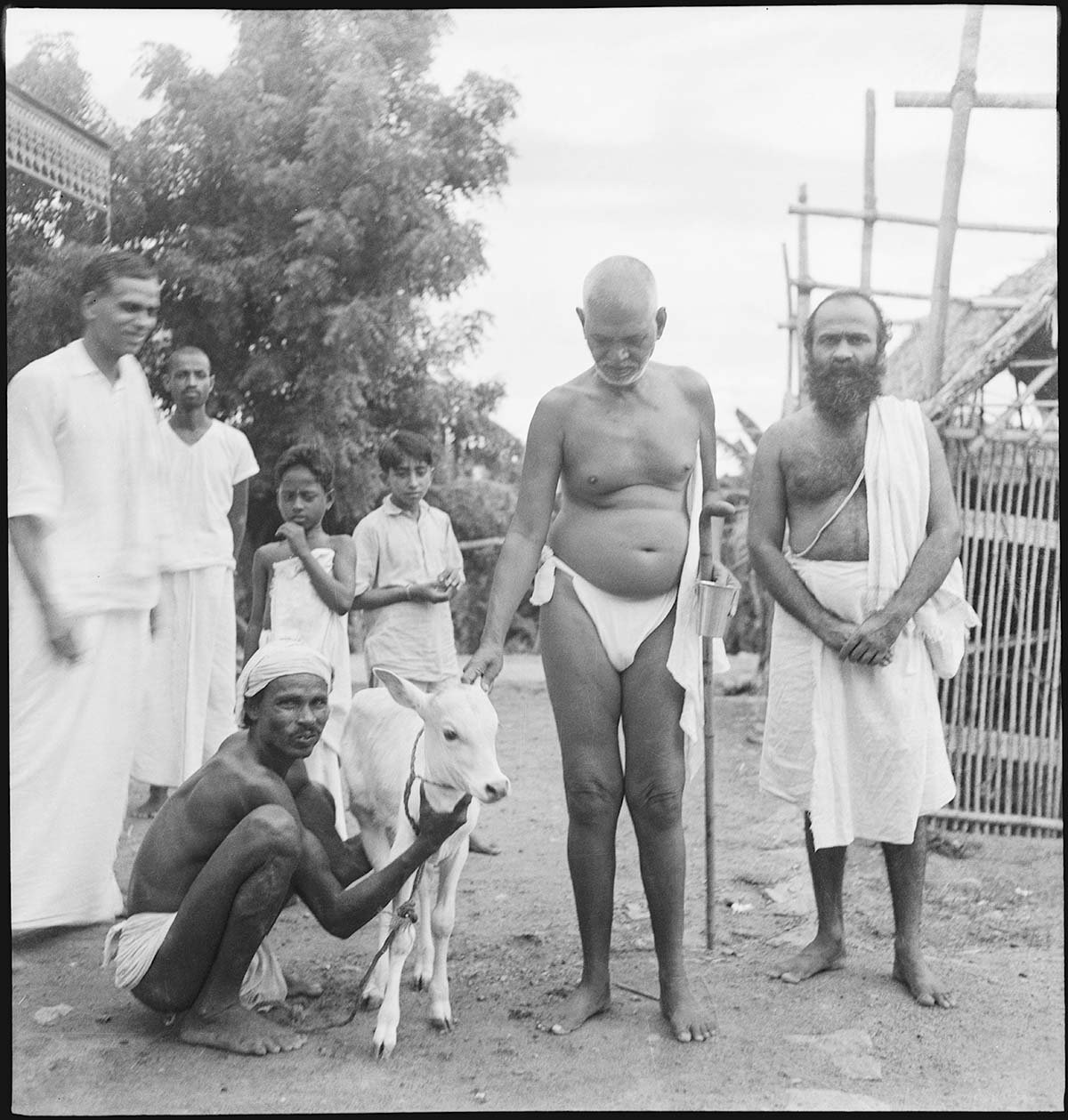Blog
Spiritual Teachings
from the Heart of Satsang
Browse by Topic through the Archive

Or use the Search Function
Latest Blog
Kaushika

Aham Sphurana
A Glimpse of Self Realisation
New Book about Sri Ramana Maharshi

Available Worldwide
On www.openskypress.com and Amazon:

“In my opinion, Aham Sphurana, a Glimpse of Self Realisation, will become a Treasure Trove of Wisdom to the Seekers of Truth in general, and particularly to the devotees of Bhagavan.”
Swami Hamsananda – Athithi Ashram, Tiruvannamalai
Kaushika
Tapas is Spontaneous, Effortless and Eternal, your Natural State.
Pages 403-409
Q.: What then is the role of tapas in bringing about Realisation?
B.: What do you suppose tapas is? Is it to sit with eyes closed without moving the body? Is it to sit in the padmasana with hands in chinmudra? Surrender is the real tapas. Listen to the following story –
Once upon a time there was an ascetic known as Kaushika. He always felt greatly proud of himself, since he felt he knew the intricacies of Vedanta in and out. He had left home to pursue study of the Scriptures and now he could confidently boast that he had mastered them all. One day, Kaushika was sitting under a tree, plunged in samadhi. Suddenly he found his concentration disturbed by a loud noise and he awoke from his samadhi.
As he opened his eyes, he observed that on top of the tree sat a crane. The crane was making a loud noise and had thus disturbed the sage’s intense austerities. The sage stared at the crane angrily. The poor crane burst into flames. Kaushika looked at the smoking, charred cadaver of the unfortunate bird lying beside him and felt sorry that he had done something so violent. Inwardly, however, he could not help feeling jubilantly proud of himself.
His powers seemed to be able to inflict unlimited destruction. Merely using the power of his thought, he had slain a healthy bird. Kaushika got up from under the tree and went to a nearby village in order so as to solicit alms. He stood outside a house calling out for alms. In those days, an ascetic waiting outside the house was to be considered a priority; he had to be fed first, before a single inhabitant of the house could legitimately partake of his share in the food prepared for the family’s consumption. The lady from the house was about to serve the waiting sage when her husband came home, tired and hungry.
The lady turned her back to Kaushika after plaintively uttering the words, ‘Please wait, oh! noble sage; I shall attend to my primary duties first and then come back to give you food.’ Kaushika bristled with rage at the words of the lady. But the lady did not seem to pay any attention to his furious mood. She attended to her husband whilst the sage waited. By the time the lady finished attending to her aged husband’s needs and came out to meet Kaushika, the sage was livid with rage for having been kept waiting on an empty stomach for so prolonged a duration of time.
Beholding the ascetic’s irate face, the lady laughed and shook her head. She said: ‘Do you think I am a crane?’. Kaushika felt stunned and puzzled. There was no way this woman could possibly know what had transpired whilst he had been outside the village. He looked at the woman in befuddlement as she continued: ‘You are supposed to be a sage, a man well- versed in Vedanta. You are no doubt under the deluded impression that you have mastered the scriptures. In my opinion, you still have to learn the true meaning of what is written there!
I am a wife and a mother. My first duty lies towards these people and not towards you. Only after serving them am I obliged to look after you.’. The sage listened dumbfounded also to these further words of wisdom from the woman.
‘A mastery of the Scriptures is not necessary to lead a virtuous life. Also, those who have mastered the Scriptures seem only to show the trait of cruelty in unlimited measure. Can mere book-knowledge alone help in accquisition of the qualities of compassion and kindness toward all living beings? If you will tide over the ocean of samsara in this lifetime, you need to learn to control yourself. The crane sat on the tree above you and made some noise. So what if it disturbed your penance for a few minutes? A man who has truly understood the import of the Scriptures would know that none of these things could possibly affect his Real Self.
Oh! foolish sannyasi, you still have a great very many things to learn!’ Kaushika found that speech had failed his throat. The words uttered by this simple-looking woman had been brief yet pointed and powerful. Finally he managed to say: ‘Oh! noble woman, please accept me as your disciple and teach me what I must know to escape from the sorrowful ocean of samsara!’. The woman smiled and said: ‘Sir! I have lots of household chores to carry out day after day. I may not be the right person to teach you all these things.
There resides a man by the name Darmavyada in the city of Mithila. Please go and talk to him. He may be able to teach you what you need to know!’ Saying this the woman retreated into the house without paying any further attention to the ascetic. Kaushika for the first time in his life realized that he really did not know anything; at once he proceeded towards the city of Mithila. There Kaushika was in for a shock when he asked for the whereabouts of the hermit known as Darmavyada. Everyone in the city knew about a butcher called Darmavyada and the butcher was evidently a highly respected person in the city. They had never heard of any hermit known as Darmavyada.
The only Darmavyada they knew of was the saintly butcher who lived in their midst. Upon hearing the words of the woman, Kaushika had spontaneously assumed that one recommended by so great a spiritual personality as that wise woman must needs be a hermit. Now he was confused. The man was a butcher and yet the people here spoke of him as if he were a divine person. Who was this man? Could this Darmavyada possibly be the Darmavyada the woman had mentioned? Could one learn anything of worth from a butcher, whose only role in society was habitual slaughter of life? Had the woman played some sort of trick upon him consequent to annoyance on her part with his short-tempered behaviour? Having come so far Kaushika decided to pay the butcher a visit, although he did not think anything good could come out of the visit.
When he arrived at the address, which was outside the city-limits and situated in a tract of land that was occupied exclusively by chandalas [ ], Kaushika saw the man busily engaged outside his shop in carving out beef pieces and handing it over to customers. He was revolted and nauseated to behold the spectacle. Yet the butcher’s face was glowing like the sun; such was its taejas [ ] that Kaushika wondered if it was the celestial sage Naradha in disguise. He overcame his initial feelings of repugnance towards the butcher and began feebly: ‘Sir, I am’ The butcher nodded his head, saying: ‘You must be the sage whom the lady sent. Please wait. I am serving my customers. I shall be able to tell you what you wish to know only after I finish my work.’
Kaushika, who had been raised in an orthodox brahmin family in his childhood, was both repelled and enchanted by the man. The man was obviously a butcher. He killed cows and sold the flesh to people. His act was clearly against all shastric [ ] injunctions. However the man did not look- in the least bit- ashamed of what he was doing. His face shone with a strange light. It was the sort of light that Kaushika had heard emanated from a person who knew who he really was. Kaushika had no doubt that the butcher was an enlightened soul. Yet how could such a one take up- of all professions- butchery for a living? This time the sage waited patiently for hours, not wanting to repeat his earlier mistake. He watched while the butcher sold his entire stock of beef and closed shop for the day.
Then the butcher walked back to his house taking the sage along with him. There the sage saw that the butcher had a family and that all of its members looked happy and well. The butcher’s parents looked thrilled upon encountering the opportunity to feed the emaciated-looking sage and they, together with the butcher’s wife, looked after the sage well. The butcher’s children were well-mannered. The sage ate with the family. The food was simple and frugal, so to the point of sparsity. It consisted only of boiled wheat-grain and salt. After eating the food, the sage felt a strange sensation of warmth pass through his body. Then he suddenly remembered his own parents.
He had ruthlessly abandoned them to pursue his goal of study of the sacred Scriptures. Thereafter he had never thought of them. What was his mother doing now? Kaushika said: ‘Sir! Who really are you? What do you know about Emancipation from samsara? I think you are the only person in the whole world who knows the true meaning of the word Liberation. Please teach it unto me!’ The butcher smiled. ‘Every person who earnestly Loves God, surrenders his individuality to Him with all his heart, and at the same time performs his earthly duties efficaciously without allowing the ego to claim responsibility for the actions of the body is assured of Liberation in this very lifetime.’
Kaushika said: ‘Sir, you are a butcher! How can you take life? Is it not a heinous crime?’ The butcher smiled. ‘This is my profession. Before me, my parents and their parents have all been butchers. I am merely engaging in my family profession. There is no shame in it. I do it as my duty. My parents, my wife and my children: these are my world and I do everything that I can do to keep them from wanting anything in life. I do everything within my capacity to keep them happy…’ Kaushika felt a strange regret stirring in his heart. Suddenly his mother’s sobbing pleas begging him not to leave the family come back to haunt him. Sadly he gazed at the butcher who was still speaking.
‘A man who is totally in control of himself and does not let his emotions rule him is verily the man of true learning. A man who runs away from his responsibilities can never Realise the actual import underlying the word Kaivalyam. Only when you discharge your worldly duties without any flaw, can you begin to know the true meaning of Emancipation from samsara.’ The butcher then gave Kaushika a full discourse on the Ajata-advaita philosophy and the supreme Aathma-vichara method of attaining enlightenment. By the time the butcher was finished, Kaushika had realized the grave crime he had committed in leaving his aged parents all alone at a time when they needed him most. He resolved then and there to make amends for his previous evil, selfish behaviour. He turned to the butcher who had set him on the right track and asked with incredulity in his voice,
‘Sir! You are by far the greatest saint I have ever seen; why is it that you must happen to be a butcher? I cannot believe that you might, in this life or any other, have committed a crime that should now force you to have to engage in a sphere of activity which involves routine murder…’ The butcher smiled. ‘Son, in my previous life, I was a sannyasi who was well-read in the Scriptures. My best friend was a king, who was well-versed in the art of warfare and fond of the sport of hunting. From him I learned how to wield the bow and arrow, but never killed any beast, for my nature was too compassionate to allow me to do any such thing. I would accompany the king on his hunting-expeditions since he always wanted me by his side; for such was his affection for me. On one occasion as usual I went on such a trip with the king. The King killed a lot of animals in the forest and was about to return. Just then a huge wild boar caught his attention in a notorious manner; with its snout, it forcefully tossed some excreta lying in the ground high up into the air. The turds landed on the king’s face and crown. The enraged king fired several shots at the fleeing animal, going behind it in hot pursuit. But mysteriously, not a single shot met its mark, although the king was a marksman par excellence.
The king’s horse became tired and he had exhausted his arrows. The king was of a delicate and sensitive mental temprament. If he did not at once avenge this insult to his honour, I knew he would resolutely end his life by ceasing to consume food and water. I could not stomach the thought of losing my dear friend, at that in such a tragic manner and for so trivial and silly a reason. Thus, to save the king’s honour, I borrowed his bow, picked up a blade of dried darbhai from the ground, charmed it with a special mantra, thereby converting it into a deadly arrow from which escape was impossible for ordinary mortals, took careful aim and fired.
Just at that instant the boar leaped behind a huge anthill and revealing its true form as an asura, laughed loudly and vanished from sight. The fatal weapon penetrated the anthill and disappeared. I at once knew something had gone wrong. If the weapon had failed to kill, it would have returned to my hand. It had not killed the gleeful asura whose wont it seemed to play this prank on meditating sages and hunting kings alike. Whose life had it then taken? Was anyone living inside the anthill? Soon the hole made by the weapon gushed torrents of blood. I and my companion the king were horrified. We cleared the anthill away to reveal the sage Bhrigu Maharshi writhing in unbearable pain. We were struck with panic and did not know what to do. The weapon had not possesed the impossible power to kill a Brahmajnani before the end of his prarabdha had arrived; yet it had inflicted severe damage unto the unfortunate sage, for his left testicle had been severed off his body. The sage whose samadhi I had unwittingly disturbed by so grotesque a means now opened his eyes and cursed me. It was because of the curse of this pious sage that I was born as a butcher in this lifetime. My friend the king begged the sage to transfer the curse to him, saying it was for his sake that I had fired the arrow.
I insisted that that should not be done, for I wanted not my friend to suffer any such perverse fate. I said that I would happily accept the curse. But the king was adamant. Witnessing the depth of our friendship from this behaviour, the sage was moved and said, “I cannot alter my words, since the words of a Brahmajnani are not his own but those from the tongue of Goddess Saraswati. But this much I can do for you. Your birth as a butcher will be your last birth, since you will Realise the knowledge of Brahman during your lifetime as a butcher. But this will hold good only if you lead the life of a grihastha and take good care of your family. I become annoyed when I hear the words of those mischief-mongers who propogate the view that one who leads the life of a householder cannot Realise the Absolute.
To nullify their empty words, in your next birth you will be a butcher and a householder; yet you will manage to Realise your true Self. Your hands will carve out the flesh of bovines but your mind will be lost in Parabrahman. Remember to dwell where the notion of thannunarvu emerges from. This is my upadesha to you. If you constantly reflect on this now, in your next birth you will Realise the Absolute without any effort or volition on your part, and without having to go through the rigours of seeking out a competent master and learning the art of Brahma-vidya from him. Is this understood by you?”. Without waiting for any reply, the noble sage then smiled at us, sprinkled some of the flowing blood on our heads in benediction, and vanished from the spot. Thereafter, unnoticed by and unbeknownst to us at the time, a demoness by the name Dhushtāshayā had come in the guise of a crow and swallowed the severed testicle of the sage lying on the ground, in due course bearing the children who would later become the dreaded, infamous demon- twins, Rhambow and Karhambow.
In my incumbent birth into this family of butchers, when I was twenty one years old, my grandfather was stropping the cleaver used for butchering, against the grinding wheel. The sound the back-and-forth movement of the knife made against the wheel forcefully reminded me of the word ‘A-ham, A-ham, A-ham…’. Immediately it struck me that the true meaning of this apparently simple word which was casually used in numerous conversations everyday was, in fact, patently elusive: it seemed an intractably profound ainigma. “I” knew many things, but did I know “I”? I wanted to explore the meaning of this thing called “I”. I asked myself “Who am I?”. The result I cannot communicate through words. It is a state of total, blissful nescience which is contaminated not in the least by the darkness of languor or sloth, but which abides timelessly as Life itself. Now I know nothing and do nothing.
Everywhere and in everything I see only my Guru Bhagawan Sri Ramana Maharshi; yet I remain not to assert that I see. My son, your mind cannot comprehend this state. The Scriptures cannot unmask it for you. Only the Uncaused Grace of the Guru can reveal it…’ Kaushika, who, struck spellbound and mumchance, had listened to the whole narrative without moving either eye-lid even once, now ventured to ask: ‘Is this the state of Brahmajnana? Can I also attain it?’ The butcher replied, ‘Surely. When you meet your Sadhguru he will guide you to Light.’ Kaushika looked at the butcher with great veneration and adulation in his eyes. He tearfully took leave of the butcher and went back to his aging parents. He served them dutifully till the end of their days.
Therefore, really all egoless or actorless action is comprised in tapas only. Ego lost, tapas is spontaneous, effortless and eternal. It is your natural state. Since you are now used to thinking thoughts, mind seems to be the natural state. It is not so.
Q.: If abandoning one’s worldly duties and running away from home for the sake of the spiritual quest is wrong, Sri Maharshi is eminently culpable in such respect, if I may be pardoned for so blatantly pointing out the fact.
B.: Again the same question! The fact is this: Sri Maharshi did not leave home for the sake of any quest.
Q.: I do not understand.
B.: Sri Maharshi was already that when he left home. He did not leave home as a sadhaka. He did not think, ‘Let us run away from home. Let us go to Tiruvannamalai and there engage in sadhana so that Brahmajnana may dawn.’.
Q.: I recollect Bhagavan mentioning, some time back, that he Realised the Imperishable, Impersonal Self only upon having had darshan of the physical form of Mt. Arunachala.
B.: True, but it was not his own volition that drew him out of home and brought him here. Volition was extinguished on the day the thought occured, ‘Maraniththal yendraal yenna?’. [Thereafter it so happened that] some force or current dragged this body all the way from there to here.
Edited by John David Oct 2021

An Incident between Bhagavan and Chinnaswami [Brother], the Ashram Manager[sarvadhikari].

Aham Sphurana
A Glimpse of Self Realisation
New Book about Sri Ramana Maharshi

Available Worldwide
On www.openskypress.com and Amazon:

“In my opinion, Aham Sphurana, a Glimpse of Self Realisation, will become a Treasure Trove of Wisdom to the Seekers of Truth in general, and particularly to the devotees of Bhagavan.”
Swami Hamsananda – Athithi Ashram, Tiruvannamalai
An Incident between Bhagavan and Brother,
the Ashram Manager[sarvadhikari].
At that moment the sarvadhikari arrived, dhoti wet as usual, to prostrate to Bhagavan. Bhagavan took no notice, but steadily looking at me, said:
நிலைமையை ஆய்வு பண்ணிப் பார்க்கும் பொழுது சிலர் கொலைக்குக் கூட அஞ்சுவதில்லை என்றெல்லாம் தெரிய வருகிறது பாரேன் (See, when we analyse the situation we come to know that some persons are not even afraid to murder!)
I flinched, for when Bhagavan is angry- an extremely rare occurrence- waves of ire are felt by his devotees to be radiating everywhere in the ether. The sarvadhikari, however, seemed to be too pre-occupied with the contents of his head to pay any attention to what he must have surmised to be a conversation going on between Bhagavan and a devotee. He rose from his prostration and went to the door.
B.: ஓய் பிச்சை! உம்மை தானடா! (Hey! Pichai! (I am) calling you only!)
The sarvadhikari stopped dead in his tracks with a startled jerk. He came and stood nervously before the master. He was the living terror of the ashram. If anyone spoke cheekily to him, he would be bundled up- lock, stock, and barrel- and thrown out of the ashram once and for all. Thereafter he would have to be content with taking Bhagavan’s darshan at Palakoththu exclusively, merely for a few minutes everyday, when the master returned from his walk on the Hill.
Bhagavan’s Grace was unwavering, but without the sarvadhikari’s grace you could not set foot inside the ashram. Such a despotic Emperor Ozymandias, King of kings, was he. But yet, here he stood now, in Bhagavan’s placid presence, quaking from tip to toe like a dry linen-smock waiting to be collected away from a washing-line jiggled about by rough wind.
He said skittishly: ‘Bhagavan must pardon me. I do not understand what Bhagavan is trying to tell me…’
B.: Did you not ask Pillai to cycle and buy some rat-poison from the town?
Ozy.: But the rats are marauding all the rice and other jute-bags filled with foodstuffs, ruining the contents!
B.: So? Is murder the solution?
O.: But after all they are mere rats…
B.: Oh! Is that so? In that case, ‘this’ [loudly striking own chest with open palm] is also a rat. Ask Pillai to buy double the quantity. One portion may be given to the four-legged rats; another may be given to this hefty two-legged rat.
Why are you blinking? After all, you are planning on doing away with thembecause you consider them pests- i.e., according to you, they are eatingfoodstuffs but not doing any productive work in the ashram, and the punishment is the death-penalty inflicted by means of administration of poison. Good. But why are you showing partiality in applying the logic? ‘This’ is the biggest pest in the ashram. The four-legged rats, poor things, swallow a few morsels to fill their tiny bellies and go away; this two-legged rat swallows entire mouthfuls three times a day. Does he do any work for the ashram in return? No.
So, let your penalty remain as it is: only, let its jurisdiction cover this giant2-legged rat also… [turning to face me] Who are we to question the propriety of decisions taken by the Sovereign? We are ‘after all’ nude beggars who ought not to be permitted a say in anything. What do we know? Of course the Sovereign is right. Let the weeds be expunged. கொலையிற் கொடியாரை வேந்தொறுத்தல் பைங்கூழ் கலை கட்டதனொடு நேர (The punishment of the king of a wretched who is worst than a murderer is like weeding [in the paddy field]) I have only one last wish. [turning to the shocked sarvadhikari again] Will you please grant it? Please ensure [again loudly striking own chest with open palm] this weed is plucked out first. I do not want to see anybody being killed…
Bhagavan leant back on the Sofa and turned his face away from us. He had becomeemotional, and his chest was heaving. He was perspiring. The sarvadhikari had become a statue. My cheeks were drenched in silent tears. Suddenly the sarvadhikari burst into a loud wail and a cascade of tears. He caught hold of the master’s feet and pressed his head on them. Those sleeping at the back of the Hall woke up in alarm and looked about them with panic. The sarvadhikari was banging his head against the wall, cursing himself,முண்டமே! மஹா பாதகா! ராக்ஷஸா! இப்படி பண்ணி விட்டாயே! (Oh, Headless Body! Oh great sinner! Oh Demon! You have done like this!) Now all rushed from the back of the hall and seized the sarvadhikari by the shoulders; they tried to calm him down. But he continued to squirm and thrash about until Bhagavan looked into his eyes again. The master said kindly,
B: It is alright. On 1st Sept., you are planning to make vellachcheedai [traditional Tamil snack], are you not? Enhance the quantity. I will myself ask Pillai not to buy poison but rat-booby-traps. Therein we will place the vellachcheedais. For the rats fry it in கடலை எண்ணெய் (ground nut oil). They will feel tempted toward the smell and fall for it. Then we can ask Pillai to release them in the forest behind simha-theertham. It is a location too far for them to return from.
The sarvadhikari’s sobs were yet to abate. Sri Bhagavan then added in a graciouscadence of voice, ‘Have you understood?’. The sarvadhikari bent down, wiped his eyes and blew his nose on his wet dhoti, prostrated full length on the ground, pressed either ear alternately upon the floor several times successively, got up, stooped down with folded palms and closed eyes in front of the master, and left, still sniffing every now and then. Everyone in the Hall was looking dumbfounded. Some bent down and asked me in a low voice what had happened. I was about to respond when Bhagavan- for a single second- directly turned and looked into my eyes. I fell
Edited by John David Oct 2021

Leave a Reply Cancel reply
You must be logged in to post a comment.






